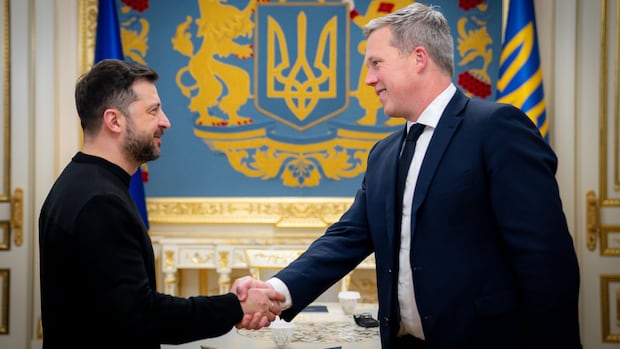Zelenskyy Faces Historic Dilemma: US Peace Plan Demands Ukraine Concessions Amid European Scramble & Escalating Attacks
 Ukraine
Geopolitics
Ukraine
Geopolitics

Zelenskyy faces a critical choice as a US peace plan proposes Ukrainian territorial concessions, sparking European concern. Amid escalating Russian attacks, Kyi
Zelenskyy Faces Historic Dilemma Over US Peace Plan Demanding Ukraine Concessions
Volodymyr Zelenskyy, Ukraine's President, has declared that his nation is enduring "one of the most difficult moments in our history." This poignant statement comes as Ukraine grapples with an agonizing decision regarding a U.S.-backed peace proposal aimed at ending the protracted conflict with Russia. The proposal, which reportedly incorporates several long-standing Russian demands, including significant territorial concessions from Ukraine, presents Kyiv with a stark choice: compromise its sovereignty or risk alienating a crucial international partner.
Navigating a Diplomatic Minefield
Speaking in a video address to the nation on Friday, Zelenskyy underscored the immense pressure Ukraine currently faces. He articulated the "very difficult choice" between "losing its dignity or the risk of losing a key partner." Despite the gravity of the situation, the President affirmed Ukraine's commitment to "work calmly with America and all partners," vowing a constructive approach to the proposals.
Earlier, Zelenskyy engaged in phone discussions with the leaders of Germany, France, and the United Kingdom—Chancellor Friedrich Merz, President Emmanuel Macron, and Prime Minister Keir Starmer, respectively. These European counterparts reiterated their steadfast support for Ukraine, even as reports suggest that the U.S. peace plan blindsided European officials. While commending the American peace efforts, both European and Ukrainian responses were notably cautious, a reflection of their desire to avoid antagonizing U.S. President Donald Trump.
Contentious Plan and European Reactions
Merz's office confirmed the leaders assured Zelenskyy of "their unchanged and full support on the way to a lasting and just peace" and welcomed the U.S. commitment to Ukraine's sovereignty and readiness to grant solid security guarantees. They emphasized the importance of safeguarding "vital European and Ukrainian interests" and maintaining Ukraine's military capacity to defend its sovereignty.
However, the contents of the U.S. plan are highly contentious. It reportedly mandates Ukraine ceding territory in the Donbas region to Russia, reducing the size of its armed forces, and abandoning its aspirations for NATO membership—terms Zelenskyy has consistently rejected. European Council President Antonio Costa, speaking from the G20 summit in Johannesburg, South Africa, revealed that the European Union had not been officially informed of any such plans, highlighting a lack of coordination.
Senior EU officials have voiced profound concerns, labeling Russia's war an "existential threat to Europe." Kaja Kallas, EU foreign policy chief, asserted in Brussels that "Russia has no legal right whatsoever to any concessions from the country it invaded," stressing that "the terms of any agreement are for Ukraine to decide."
Ongoing Discussions Amidst Challenges
Zelenskyy acknowledged discussions with European leaders about the plan, appreciating the efforts of President Trump and his team, but confirmed that "working on the document" is ongoing. He added via Telegram that coordination is close "to ensure that the principled positions are taken into account."
This diplomatic tightrope walk occurs amidst escalating military and domestic challenges for Zelenskyy. Russia's larger army continues its battlefield advances, while Ukraine grapples with a significant internal corruption scandal. The Kremlin, through spokesperson Dmitry Peskov, maintained that Moscow had not officially received the U.S. peace plan, dismissing current U.S.-Russian diplomatic contacts as lacking "substantive discussion."
Continued Aggression on the Ground
Tragically, these political developments unfold against a backdrop of continued aggression. On Friday, a Russian glide bomb struck a residential district in Zaporizhzhia, southern Ukraine, killing five people and injuring ten, including a teenager. This marked the third instance of high-rise damage in the city by such bombs, also devastating a local market. Simultaneously, a Russian drone assault on Odesa injured five, including another teenager. These attacks followed a devastating barrage two days prior on Ternopil, western Ukraine, which claimed 31 lives, among them six children, and injured 94 others, with 13 still unaccounted for.